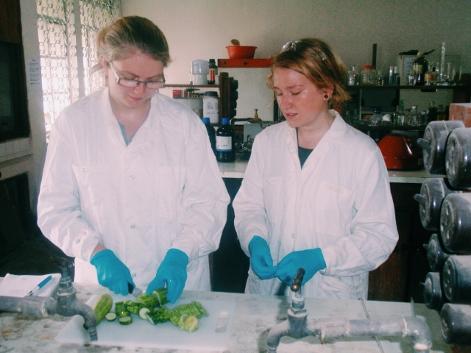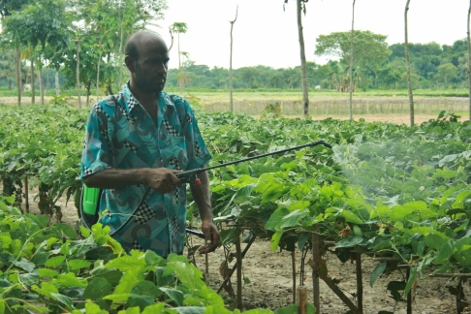Tracing pesticides in cucumbers in Bangladesh
Jennie Haag and Anna Landahl did their Minor Field Study in collaboration with the ISP supported research group in Organic chemistry at Dhaka University, Bangladesh.
Where did you go and what was your research subject?
We went to Dhaka, Bangladesh to investigate four chosen pesticides in cucumbers cultivated in Bangladesh. We wanted to study something related to toxic chemicals in the environment and through ISP we got in contact with the research group in organic chemistry at University of Dhaka, studying organic pollutants in food, water and environment.

Did you reach any interesting results?
We came to Bangladesh thinking that we would use an already existing method for investigating pesticide in cucumbers, but since no such method existed we had to spend most of our time there developing a method good enough to use. We also thought that the samples were going to be from the experimental cucumber cultivations where it is controlled what pesticides are sprayed and when. Instead we received samples from farmers and markets where we did not know what pesticides had been used and in what amounts, which complicated things a bit. But despite some practical problems we reach the conclusion that none of the samples contained any of the four pesticides we were looking and that the laboratory was contaminated with phthalates and chlorinated paraffines.
What would you say are the most important experiences from your time in the field?
That there are great differences between how you work in a laboratory in a developing country and how you work in Sweden. It puts things in perspective to work in a country that works entirely different in so many ways. Sweden is a small country and here things work very smoothly and you easily forget how difficult things can be in other places.

A farmer spraying unknown pesticides on a cucumber cultivation without any safety equipment.
Do you recommend others to apply for a MFS grant? Why?
Definitely! It is one of the best things we have ever done. It was a great experience and I think we got the most out of it since we ended up in a country where it is hard to tourist and because we spent all of our time with Bangladeshi people. We never would have gotten this experience if we would have gone there as tourist. We got the possibility to work people in the lab and got close to them in a way that would not have been possible otherwise. Even if there were some flaws in the working environment the experience was great and something we recommend everyone to do!
More information
Name: Jennie Haag & Anna Landahl
University: Uppsala University
Field of study: Master Program in Environmental and Water Engineering
Level of thesis: Advanced level (15 credits)
Period of MFS: Summer 2013
Jennie Haag and Anna Landahl did their Minor Field Study in collaboration with the ISP supported research group in Organic chemistry at Dhaka University, Bangladesh.
Read the MFS-thesis:
Pesticide residues in cucumbers cultivated in Bangladesh Pdf, 13 MB.
